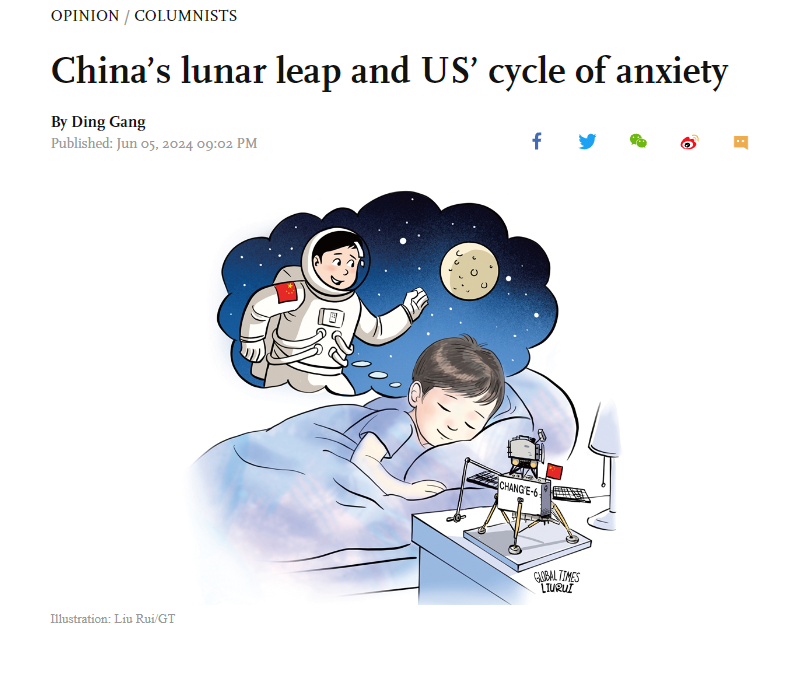LATEST INSIGHTS
Your Present Location: LATEST INSIGHTSDing Gang: China's lunar leap and US' cycle of anxiety
Source: GT Published: 2024-06-05

On a crisp Sunday morning, China's National Space Administration announced a milestone that would have made Chang'e, the moon goddess in Chinese mythology, beam with pride: Chang'e-6, the lunar lander, successfully touched down on the moon's far side, bringing humanity one step closer to unraveling the mysteries of the lunar dark side.
This achievement is more than just a feather in China's cap; it's a bold statement in the unfolding Western media's made-up hot saga of the US-China space race.
The Western media is quick to frame Chang'e-6 as another chapter in the long-standing rivalry, with a chilly cold war undertone that sends shivers down the spine.
Ever the skeptic, Washington warns that China's space ambitions are a smokescreen for 'military dominance.' But let's take a step back and look at the bigger picture. This is about two different models of development, each vying for global influence and technology dominance.
Ars Technica, a tech news website, points out that the dominant space storyline for the rest of this decade is the US-China competition. China, with its stability and long-term planning, stands in stark contrast to NASA's susceptibility to the whims of changing political tides.
These remarks seem to have a bit of an 'old wine in a new bottle' vibe - They appear to draw inspiration from the 1960s space race between the US and the Soviet Union, equating space exploration with a life-and-death struggle between two major military blocs.
With two giants, and their very different political systems, with their own strengths and vulnerabilities, how does the future of the world look?
A few years ago, Francis Fukuyama, a Stanford professor, wrote about this historical competition in his piece 'Exporting the Chinese Model': 'As 2016 begins, a historic contest is underway over competing development models… Although this contest has been largely hidden from public view, the outcome will determine the fate of much of Eurasia for decades to come.'
American policymakers focused on ideological and systemic rivalry are growing more concerned about China's perceived advantages. This worry is justified - China is making progress not only in space but also in other areas. Looking at China through the prism of constant competition leads to never-ending frustration and anxiety, and even madness.
But what if we took a step back, and embraced a broader perspective? China's modernization is aimed at the happiness and development of its people. The lunar landing is a testament to the success of China's system and development path. It's not about outdoing the US; it's about contributing more pathways for human progress.
So, let's not get trapped in this cycle of anxiety and rivalry. As an old Chinese saying goes, 'Take a step back, and the sea is wide and the sky is vast.' China's lunar leap is a win for humanity, offering new horizons and possibilities.
The Chinese lunar exploration program isn't just blindly following America's Apollo missions. Like any breakthrough in technology and industry, it's carving its own path, drawing from its cultural heritage and development principles. Just as the name of Chang'e stems from the graceful moon goddess in ancient Chinese mythology, it's not about threats but about humanity's curiosity and yearning for the unknown.
It's time we recognize that this isn't just a race; it's a journey, and on this new road there's room for everyone.
The author is a senior editor with the People's Daily, and currently a senior fellow with the Chongyang Institute for Financial Studies at the Renmin University of China. dinggang@globaltimes.com.cn. Follow him on X @dinggangchina























































































 京公网安备 11010802037854号
京公网安备 11010802037854号





